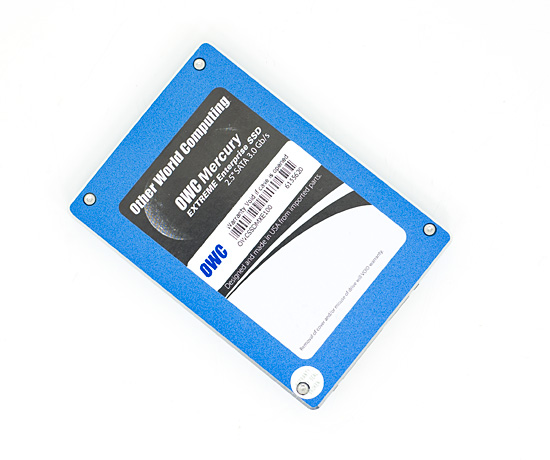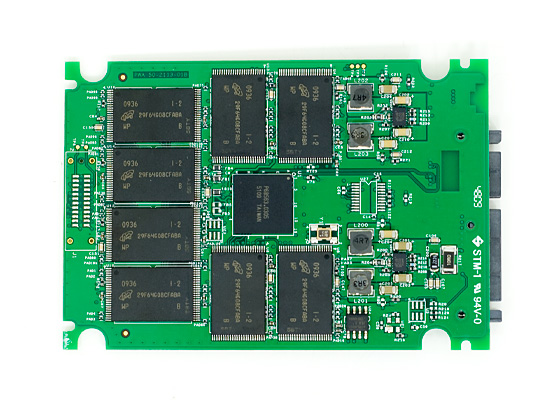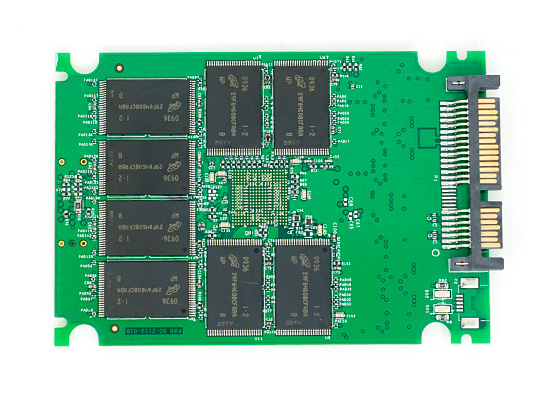OCZ’s Vertex Limited Edition Review & SSD State of the Union
by Anand Lal Shimpi on February 19, 2010 12:00 AM EST- Posted in
- Storage
OWC - Hot on OCZ’s Heels
Other World Computing, a well known Mac parts reseller, is now also an SSD manufacturer with its own SF-1500 based product.

It’s called the OWC Mercury Extreme Enterprise SSD and is identical to OCZ’s Vertex LE. OWC appears to be a bit behind OCZ as the drives they’ve been sending out still have the older version of SandForce’s firmware. OWC’s pricing appears to be on-par with OCZ’s Vertex LE, but I don’t have final word on availability. Update: It looks like drives are actually available! No word on what firmware revision is shipping on these drives though, I hope to have that information next week.

OWC's SF-1500 sans supercap

The OWC 100GB drive I received performs similarly to last year’s Vertex 2 Pro and today’s Vertex Limited Edition but it’s still using the older firmware. I’m shipping it back to OWC and will hopefully get an idea of final pricing, availability and configuration shortly.










83 Comments
View All Comments
neoflux - Sunday, February 21, 2010 - link
part number is K9HCG08U1M-PCB00, but still can't find a size in nm.neoflux - Monday, February 22, 2010 - link
Further research shows me that no one knows what manufacturing process size these actually are, which I find strange. No reviews include the information, there are no manufacturing spec sheets, etc. Only that they are lead-free and have 48 pins, haha.This all must makes me more curious. How does no one know?
eldiablopotato - Sunday, February 21, 2010 - link
Both the OCZ & Crucial SSDs are nice, since my motherboard can't do 6Gbps can anyone recommend which SSD to get? I'm thinking Crucial SSD, but then again I'm no expert on SSDs like Anand. :PFeedback welcomed.
nivek - Sunday, February 21, 2010 - link
OCZ says they can't get any more sandforce controllers at a low price point. But how does OWC get the same controller for their Mercury Extreme Enterprise SSD. OWC 100GB SSD is priced the same as OCZ Vertex LE 100GB!http://eshop.macsales.com/shop/internal_storage/Me...">http://eshop.macsales.com/shop/internal_storage/Me...
Per Hansson - Sunday, February 21, 2010 - link
Just curious about the missing capacitor, will there not be a big risk of dataloss incase of power outage?Do you know what design changes where done to get rid of the capacitor, where any additional components other than the capacitor removed?
Because it can be bought in low quantities for a quite ok retail price of £16.50 here;
http://www.tecategroup.com/ultracapacitors/product...">http://www.tecategroup.com/ultracapacitors/product...
sjobal - Sunday, February 21, 2010 - link
Hi Anand,I'm curious to know what SSD is most suitable for a mac. Since OSX does not support TRIM, some sort of garbage collection has to be done within the drive (firmware) or a software tool has to be available for OSX.
Is this something you'll look into in forthcoming reviews?
Best regards!
AnnonymousCoward - Saturday, February 20, 2010 - link
Anand,How can you benchmark in so many different ways, and yet end up with hardly any relevant information? All those PCMark graphs don't tell me squat. Your AnandTech Storage Bench is flawed, since (as your last article found) the SandForce uses compression and IOPS don't equal bandwidth! Why does the user care about IOPS?? Do they care about IOPS of their graphics cards? Or CPU?
With CPUs, you measure things like encoding time and game framerates. Things that matter!
This is the 3rd time I'm posting this. Refer to the last time: http://tinyurl.com/yjcr5vm">http://tinyurl.com/yjcr5vm
Zoomer - Sunday, February 21, 2010 - link
It's a waste of time to do what you're suggesting. The point of SSDs is to improve the user response time.Encoding time? It would likely be virtually identical due to the modern pre-fetching algorithms in place.
Game framerates won't really be affected since the average of 3 runs is taken. After the first run, most everything will be cached, either in hardware or in software by the os in mem.
In the real world, you would expect to see less dips in fps (min fps will be higher), assuming it is a fresh first run.
bradley - Sunday, February 21, 2010 - link
The point is germane. New SSD benchmarks are required to measure real world performance. Some of the current benchmarks end up limited to measuring nothing more than cache speed. IOPS is impractical and demonstrates nothing indicative regarding real world performance.the Problem with Write IOPS - in flash SSDs
http://www.storagesearch.com/problem-write-iops.ht...">http://www.storagesearch.com/problem-write-iops.ht...
erple2 - Sunday, February 21, 2010 - link
Ordinarily, I'd agree with you. However, the point of the article was to point out the problems with "older" benchmarks that would simply look at, in a vacuum, IOPS of a drive was inconsistent at best, and misleading at worst. In the case of Anand's testing methodologies, you see that the IOPS numbers he comes up with are, in fact, the "worst case scenario" listed for SSD's in the article you linked to.Until the giant Meltdown of SSD's in Anand's article (http://www.anandtech.com/storage/showdoc.aspx?i=35...">http://www.anandtech.com/storage/showdoc.aspx?i=35..., testing methodologies that benchmark reviewers were using were definitely perfectly suited to the problems with SSD's, namely the write-erase cycle being specifically excluded from the benchmarks. That indicated the main problem storagesearch.com referred to in the above linked article.
Anand has since changed his benchmark methodology for all SSD's to be a "polluted" SSD - he does not simply wipe the drive clean, then benchmark. He first fills the drive with data, then does a format (which does NOT wipe the drive clean - you still have the write-erase cycle to contend with), then runs benchmarks.
The other thing to look at is that the benchmarks that Anand looks at are, in fact, consistent. Saying that one drive attains 600 IOPS on "Anand's light StorageBench" where another attains 500 IOPS _ON THE SAME BENCHMARK_ does, in fact, give you a reasonably accurate comparison. The trouble you'll get into is if you state "Drive X gets 5000 IOPS, but Drive Y gets 9000 IOPS", not mentioning the actual benchmark used, or even worse, cherry-picking the benchmarks to favor the particular Drive. Then, you have to dig down and figured out whether the benchmarks that gave you "5000 IOPS" was, in fact, properly executed - is that really indicative of the performance of the drive, or only in a very tightly controlled environment to maximize performance numbers? However, that's a question you always have to look at regardless of what you're testing, be it video cards (3D Vantage doesn't give you an accurate picture of how well the card will perform in some particular scenario), CPU's (SPECint or SPECfp give you minimal information about how a CPU performs in a large database environment) or other devices.
So really, I think that the point the article in storagesearch is hammering at you should be wary of reading more into generic IOPS as a benchmark for these SSD's as is simply stated.
So, in conclusion, I disagree about 80% with what you have written.
(minor "edit"):
So I've re-read the GGP post - while it is true that IOPS as a number means nothing to me, it also winds up being true that posting a Bandwidth number would also be more or less worthless to me - what is important is the general ranking of these devices in the same benchmark. The benchmark is measuring the _relative_ performance of each of the drives in the same sequence of tests. Taking conclusions like "this drive gets 600 in a benchmark and that one gets 400 in another benchmark" ultimately fails.
(BTW, Anandtech staff, please fix the fact that I can't use any "rich" text in these posts)